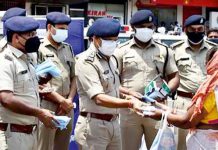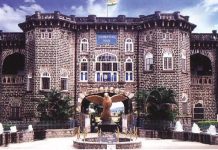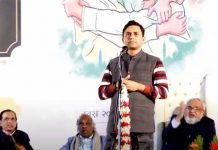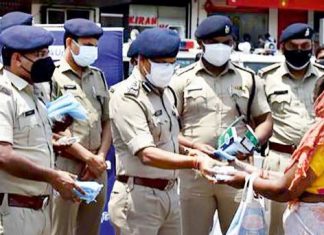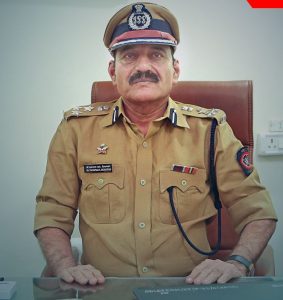 If you are feeling down on your luck, the life of Pratap Dighavkar, Additional Commissioner of Police, Thane and East Region, a Farmer turned Policeman, is just what you need to inspire you.
If you are feeling down on your luck, the life of Pratap Dighavkar, Additional Commissioner of Police, Thane and East Region, a Farmer turned Policeman, is just what you need to inspire you.
Personifying the transformation of a farmer in a small village into an IPS officer, Dighavkar is proof that you must never give up on your dreams. As a top cop, he is going that extra mile to keep criminals at bay in his jurisdiction along with his dedicated police force. His love for planting trees earned him the Indira Priyadarshani award, from the Union ministry of environment in 2001. He was conferred the Vanshree award, the highest State award forplantation & Forestation in 2001.
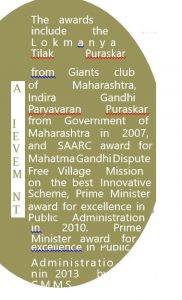 He is also a recipient of the President’s Police medal for meritorious services and DG insignia for excellent performance and service record. In a candid interview with Mumbai Protector Correspondent, Nitesh Poojari,
He is also a recipient of the President’s Police medal for meritorious services and DG insignia for excellent performance and service record. In a candid interview with Mumbai Protector Correspondent, Nitesh Poojari,
Shri Dighavkar shared how he was very passionate about serving in the government and how he became an IPS officer after starting off as a farmer.
What prompted you to join the police force?
I was born in a small village called Litania near Nashik. We had only one primary school in our village and the only available profession for men was farming. Since I was young, I aspired for something more. I wanted to be a part of the government. This desire was borne out of a really funny incident. As a boy I saw an Aeroplane in the sky, I asked my mother who owned those planes, and she randomly said ‘the government’. Since then that’s what I wanted to be a part of. I used to study night and day, and stood first in the SSC board exams. After that, I got into college, which was 23 kilometres away from home, but I didn’t miss a day. Despite getting 86 per cent, I was unable to secure admission at the only college we had in our village by one mark. That’s when my father told me that it was time for me to give up studying and become a farmer.
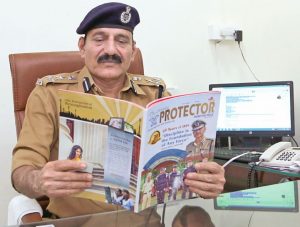 At the age of 16, I was a full-fledged farmer, but because of a dispute with my dad, I decided to revisit my dream of studying further. I borrowed Rs 350 from my mother and enrolled myself in a distance learning programme. While I was still working hard on the field, I was studying night after night to get my degree. At 18, I had completed my graduation incurring a total expenditure of Rs 1,250. I cleared my Police Service exam and the combined defence exam as well. In 1987, at the age of 22, I was selected for the post of Assistant Commissioner; it was the happiest day of my life.
At the age of 16, I was a full-fledged farmer, but because of a dispute with my dad, I decided to revisit my dream of studying further. I borrowed Rs 350 from my mother and enrolled myself in a distance learning programme. While I was still working hard on the field, I was studying night after night to get my degree. At 18, I had completed my graduation incurring a total expenditure of Rs 1,250. I cleared my Police Service exam and the combined defence exam as well. In 1987, at the age of 22, I was selected for the post of Assistant Commissioner; it was the happiest day of my life.
What is your impression about the youth of today?
There was a perception or I would say illusion, that anyone who is coming from the background of farming, has no chance of a career in the police force. But when I joined police force, this perception was dissolved and now most youth joining the police force are from rural areas and most of them are from the farming background. The police uniform became my passion and to join the police force was my dream. And I achieved my dream and this shows that nothing is impossible when you are eager to achieve it. Youth gives one many advantages. You can take decisions fast, lead from the front, and you have all the energy. Even if you are given a high responsibility, you can discharge it to win the admiration of those whom you lead. IPS training is for a period of 2 years and 4 months and it would be even more, if you include the probationary period. During training, you would be taught law, investigation, evidences, man management, and inter personnel skills. We visit colleges and schools to conduct workshops for students who are aspiring to join the police force. We also started a competitive examination centre in my village
and now my village has earned the distinction of having the maximum rate of selection in the State. We in the village built a school for tribal people and now there are 400 children studying there. My appeal is, ‘Don’t be a Reel hero, be a Real hero and if you want be a real hero in real life, then join the police force.
Naxals are a major threat in Pune rural areas. Since you served there as an SP, can the naxalite crises be resolved?
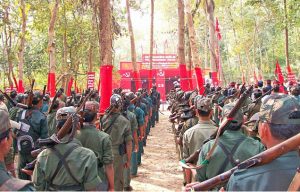 I served as Pune SP for 2 years and was aware that Naxals were trying to make inroads in Pune rural areas. Over ten of them were recently arrested by the anti- terrorism squad. I have directed my police personnel to keep a tight vigil in the villages to ensure that the rebels cannot get any foothold in the district. I am also visiting schools and colleges within my jurisdiction as Maoists target youth and children to induct them into their fold. I appeal to the young generation to not get misguided and should instead join the police and defence forces to serve the motherland. We are now collecting data on labourers, coming from other states for work to Pune rural areas, from the contractors as well as the companies that hire them. A special squad is being prepared to tackle the Maoist menace. The Pune rural police would thwart all the attempts of rebels to create a base here.
I served as Pune SP for 2 years and was aware that Naxals were trying to make inroads in Pune rural areas. Over ten of them were recently arrested by the anti- terrorism squad. I have directed my police personnel to keep a tight vigil in the villages to ensure that the rebels cannot get any foothold in the district. I am also visiting schools and colleges within my jurisdiction as Maoists target youth and children to induct them into their fold. I appeal to the young generation to not get misguided and should instead join the police and defence forces to serve the motherland. We are now collecting data on labourers, coming from other states for work to Pune rural areas, from the contractors as well as the companies that hire them. A special squad is being prepared to tackle the Maoist menace. The Pune rural police would thwart all the attempts of rebels to create a base here.
What are the other challenges before the Pune rural police?
The Pune rural police has a jurisdiction of 16,000 km involving 31 police stations with manpower of 2,268 officials. The land mafias are active here in grabbing lands and such cases are on the rise. In fact, crores of rupees are involved in these cases and the white collar goons are equally involved. Moreover, land disputes among families are increasing that adds to the problem. We are planning to develop a new cell, Economic Offences Wing (EOW), due to the rising cases of land disputes so that the problem could be tackled more effectively. Recently, the Pune rural police was awarded Rs 19.90 crore by the Maharashtra government for making 788 dispute-free villages. We plan to share the award among all these villages to improve their basic infrastructure.
You went Australia for a mid-career training programme. Please throw some light on the training you received.
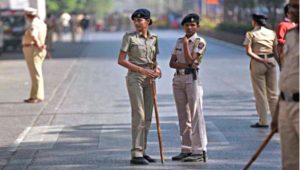 Five IPS officers including me from the state took this training initially at Hyderabad and then went to Australia. It was a fantastic opportunity to learn new things about the police force of Australia and how it operates within their country. When we went there, elections were going on. But over there no one shouted slogans or put up posters or banners. The election process was conducted peacefully. It was really an amazing experience. Over there it is mandatory for every citizen to give their DNA samples. There is a DNA samples bank and crimes are detected with the help of these samples.
Five IPS officers including me from the state took this training initially at Hyderabad and then went to Australia. It was a fantastic opportunity to learn new things about the police force of Australia and how it operates within their country. When we went there, elections were going on. But over there no one shouted slogans or put up posters or banners. The election process was conducted peacefully. It was really an amazing experience. Over there it is mandatory for every citizen to give their DNA samples. There is a DNA samples bank and crimes are detected with the help of these samples.
You were part of 1993 bomb blast investigation team. Recently a special court delivered judgment after 24 years, so what is your view on it.
1993 Bomb blasts was a large scale coordinated terror attack, and when this incident took place, I was posted as Sub Divisional Police Officer (SDPO) of Alibaug. And during the investigation, it was revealed that arms, ammunition and explosives had landed in Mahad division. My seniors asked me to be with investigating team as it was an emergency situation. So, during the investigation, the team recovered 18 AK- 56 rifles, besides 30,000 rounds, 50 hand grenades, and 84 other firearms. Later, the case was transferred to the CBI but we were the first team to investigate it. And this was first major case where I was part of investigating team and got lot of exposure. Following the trails and leads in these cases was a very tough job, because we needed to gather all witnesses, besides recovering all the arms and ammunition. Even though the blasts took place in 1993, the investigations went on till 2017. As the trial continued we had to present in court. The special court has delivered judgement after 24 years and convicted almost80 accused. I got what I think is my biggest opportunity. It was a learning experience for me to be part of one of the best investigating teams.
What are the other challenges before the Thane City police?
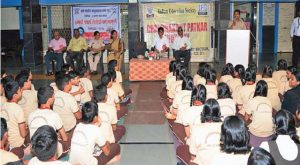 In Thane there are three major challenges: 1) We are having crime related theft like, chain snatching, robbery, and house breaking, These crimes appear to be small but create a lot of concern and insecurity in the minds of the common public. Now mobile phone has become important aspect in everyone’s life. Recently we have arrested 19 people and recovered 184 mobile phones from their possession. 2) Illegal development and fraudsters – Many people in Thane are duped over illegal land and cheated by being provided fake documents. 3) Organized Crime. To stop this, we have Police Mitra, where 20 to 25 youth are given T-shirts named as Police Mitra, caps and one police lathi. As per the Bombay Police Act, we have power to appoint special police officers. We are using this Police Mitra for three purposes: 1- Night Patrolling to prevent crime. 2) Few Police Mitra are part of NGOs that play the part of providing information to the narcotics department. 3) Few Police Mitra are used during festivals for bandobast. These three purposes are the core areas of Police Mitra and Community Participation.
In Thane there are three major challenges: 1) We are having crime related theft like, chain snatching, robbery, and house breaking, These crimes appear to be small but create a lot of concern and insecurity in the minds of the common public. Now mobile phone has become important aspect in everyone’s life. Recently we have arrested 19 people and recovered 184 mobile phones from their possession. 2) Illegal development and fraudsters – Many people in Thane are duped over illegal land and cheated by being provided fake documents. 3) Organized Crime. To stop this, we have Police Mitra, where 20 to 25 youth are given T-shirts named as Police Mitra, caps and one police lathi. As per the Bombay Police Act, we have power to appoint special police officers. We are using this Police Mitra for three purposes: 1- Night Patrolling to prevent crime. 2) Few Police Mitra are part of NGOs that play the part of providing information to the narcotics department. 3) Few Police Mitra are used during festivals for bandobast. These three purposes are the core areas of Police Mitra and Community Participation.
One Cop One Criminal Scheme
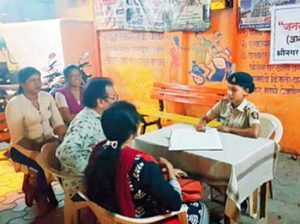 We have also started a scheme called ‘One Cop One Criminal under which a police constable is entrusted responsibility of tracking each of the accused charge sheeted in the past seven years. Normally, after submitting charge sheet, police have no connection with the accused. But under this system, we have deployed one constable for tracking each of the accused who is involved in major offences like rape murder, robbery and chain snatching. This ensures that the accused are under the active surveillance of the police. This scheme will effectively put the brakes on future crime. And in case, if any of the accused show signs of reforming, then he or she can become a good police informer. And these same people would definitely help us solving big cases in future. We have another scheme, Society Cop under which our officials take care of senior citizens who are alone or couples who are very elderly and there is no one to look after them. So our officers make sure that they are safe in the society. We also received many complaints from parents about nuisances outside schools, so we have one constable for one school and one police officer for one college. Every second and fourth Saturday, the court is closed and so on these days, the constables and officers visit the colleges and schools to check if there is any serious matter and for this they can also take help of senior officers of local police stations. The contact details of these officers are shared with principals and professors of schools and colleges. So if there is any emergency, they can contact them directly.
We have also started a scheme called ‘One Cop One Criminal under which a police constable is entrusted responsibility of tracking each of the accused charge sheeted in the past seven years. Normally, after submitting charge sheet, police have no connection with the accused. But under this system, we have deployed one constable for tracking each of the accused who is involved in major offences like rape murder, robbery and chain snatching. This ensures that the accused are under the active surveillance of the police. This scheme will effectively put the brakes on future crime. And in case, if any of the accused show signs of reforming, then he or she can become a good police informer. And these same people would definitely help us solving big cases in future. We have another scheme, Society Cop under which our officials take care of senior citizens who are alone or couples who are very elderly and there is no one to look after them. So our officers make sure that they are safe in the society. We also received many complaints from parents about nuisances outside schools, so we have one constable for one school and one police officer for one college. Every second and fourth Saturday, the court is closed and so on these days, the constables and officers visit the colleges and schools to check if there is any serious matter and for this they can also take help of senior officers of local police stations. The contact details of these officers are shared with principals and professors of schools and colleges. So if there is any emergency, they can contact them directly.
For Women, we have Mahila Dhaksata Committee at every police station, and also have two control rooms for women in Ulhasnagar and Kalyan. This committee has solved almost 60 to 70 cases in six months. Our main concern is school and college girls who are harassed by the Romeo’s. So, our women squads are regularly patrolling and we have also shared their contacts. If there is any emergency, they can directly contact them. We have given training to women police, so they that they can resolve the problems through proper counselling.
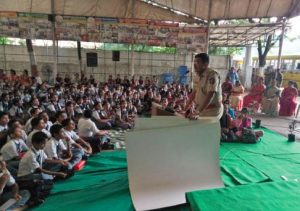 Home for 10,000 Police Constables
Home for 10,000 Police Constables
One of my dreams was to build houses for police constables. Now finally our dream has come true. We have embarked on one of the largest welfare projects in the World wherein we will construct houses for 10,000 police constables. We are providing 850 square feet houses which are equal in space to houses of DCPs which will be built on 118 acres of land in Panvel.
Any message to our readers?
Mumbai being the economic capital of the country, maintaining peace in the city is very crucial. While the police have been doing a commendable job, the citizens need to do their bit too by cooperating with them. The Protector has rendered immense service by sensitizing the public on the issue of the society & security and fight against terrorism. I am glad to note that it has succeeded in facilitating the police-public connect, an essential feature required for maintaining law and order.
Pratap Dighavkar, Additional Commissioner of Police, Thane (East Region)

